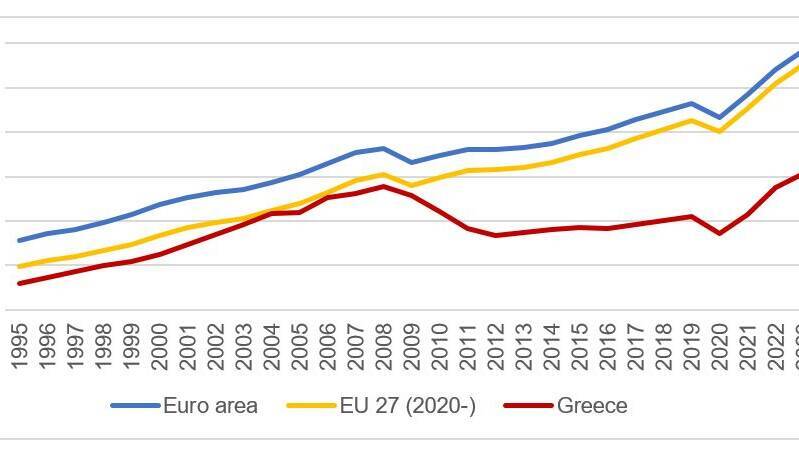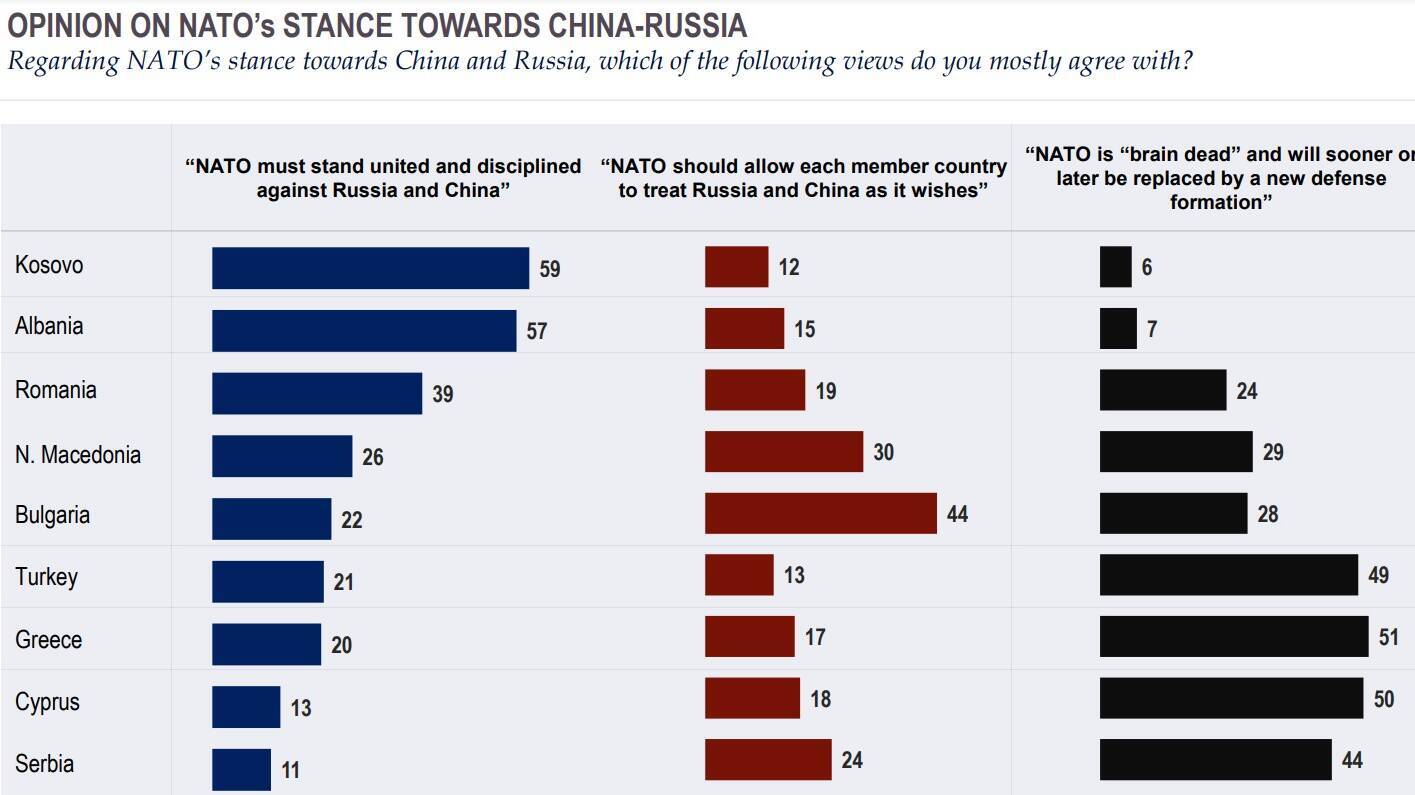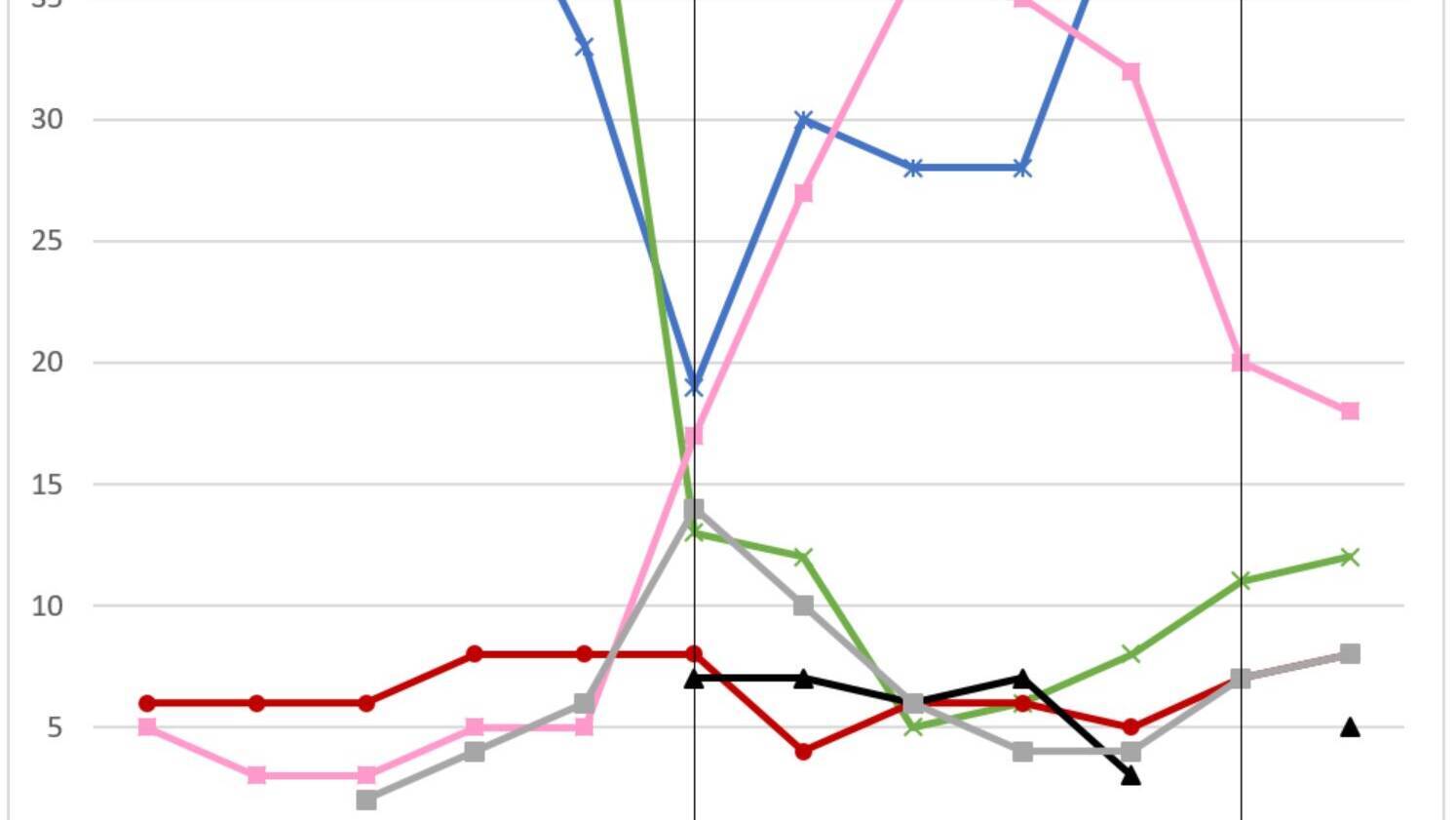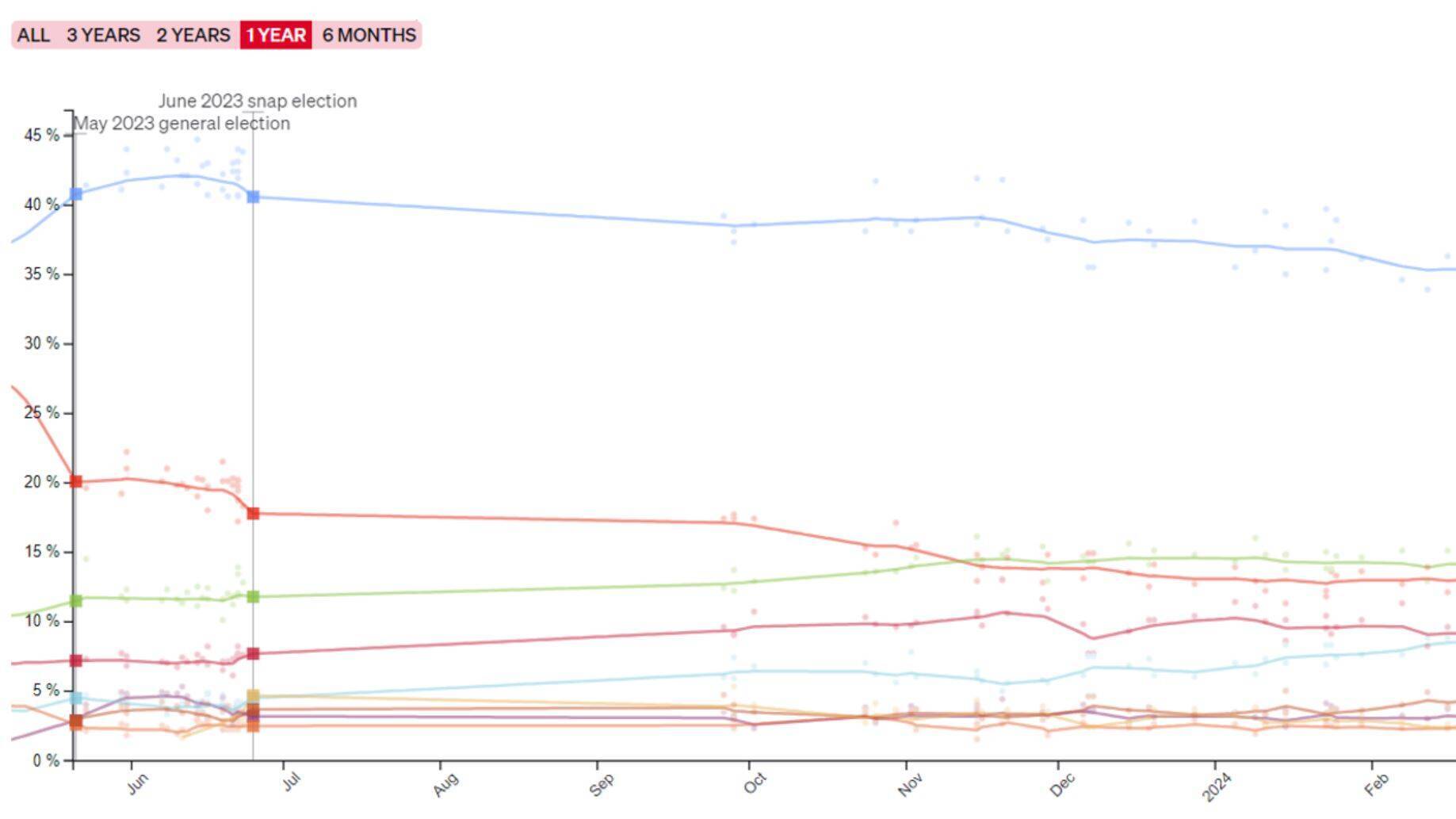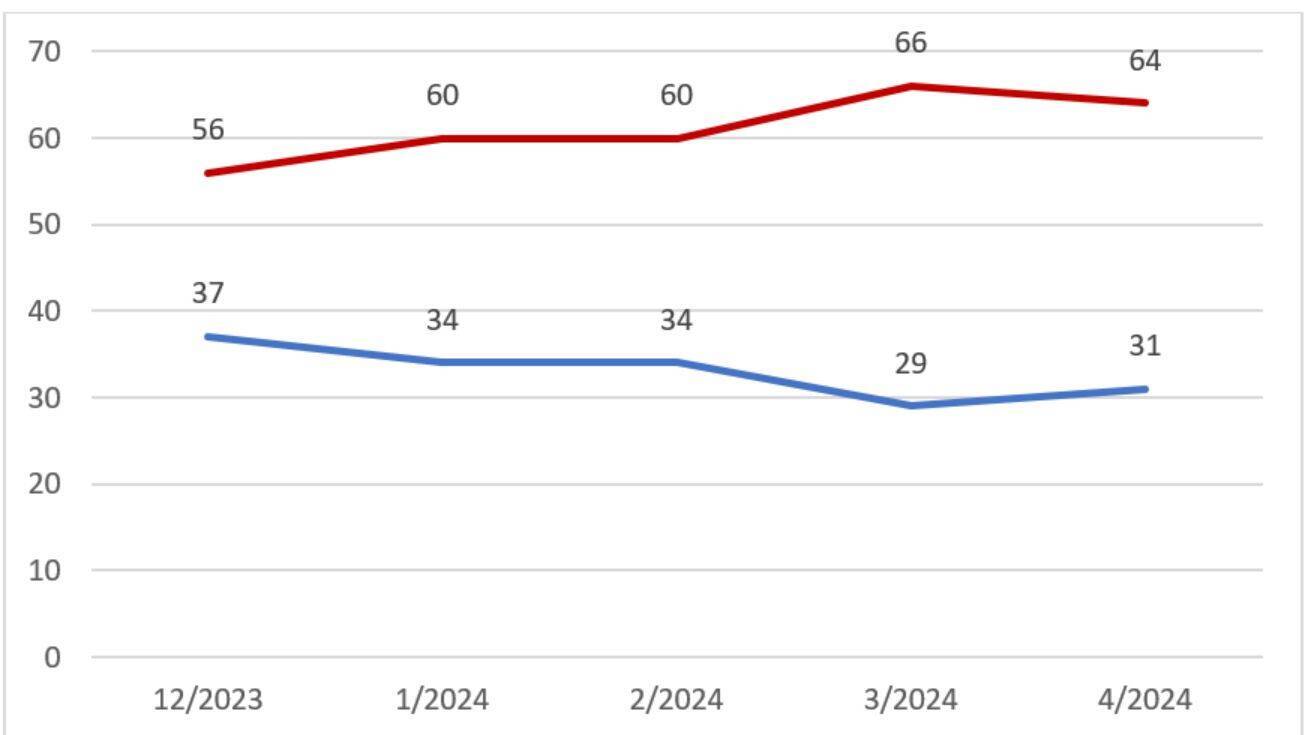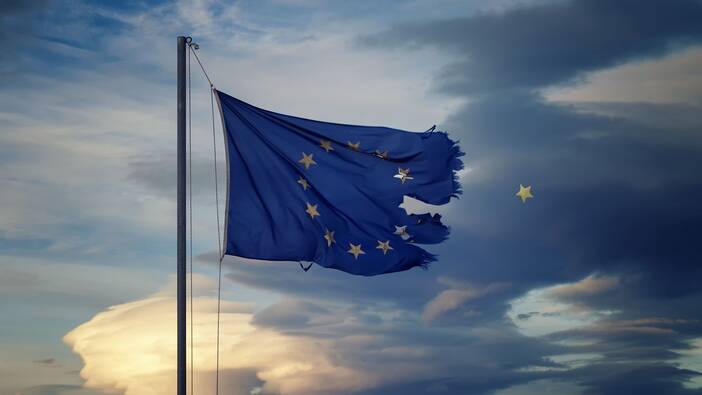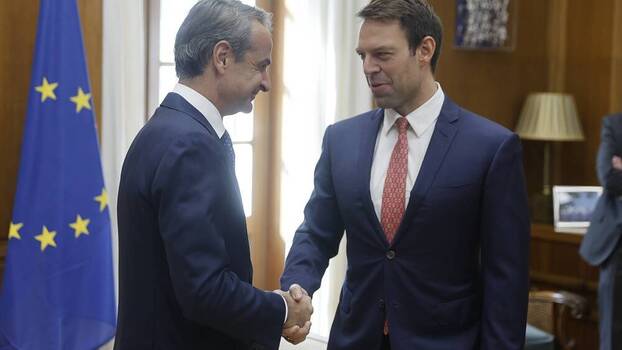
The 2019 European elections in Greece marked, at least symbolically, the end of the crisis and the memorandum era. However, given the economic context of the upcoming European elections on 9 June 2024, the country’s trajectory seems more like an uncertain return to a fragile “normalcy”.
Danai Koltsida is a Greek political scientist and lawyer. She is currently co-vice president of the transform! Europe network.
This is, of course, related to the effects of multiple crises that have affected, more or less, all European societies (the COVID-19 pandemic, the energy crisis, inflation, wars, etc.). However, what distinguishes the Greek case is the fact that these crises have a cumulative impact on an economy and society already experiencing long-lasting effects from the austerity measures of the previous decade (2010–18).
In fact, Greece is still far from fully recovering from the consecutive fiscal adjustment programmes. The process of convergence of the Greek economy with the European average, which started before and accelerated with the country's accession to the EU in 1981, was not only halted, but was violently reversed after the first memorandum in 2010, whereas the stabilization and subsequent partial recovery of the economy has not been enough to put the country back on a convergence track.
This deviation is very clear in all the economic — and, most importantly, social — indexes. Greece is not only one of the poorest countries in the EU, together with Bulgaria, it is also the worst in terms of unemployment, especially female and youth unemployment. In terms of wages and salaries, it is seventh worst in the EU together with Slovakia, Poland, Hungary, Latvia, Romania, and Bulgaria (all having joined the EU 23 years later than Greece). In terms of prices, especially food prices, Greece is second-worst in the EU, and in terms of income inequality, Greece is ninth-worst in the EU, together with other countries on the European periphery like Bulgaria, Lithuania, Latvia, Italy, Spain, Romania, Portugal, and Estonia. As a result, Greek society finds itself coping with the consecutive crises of the new decade, while starting from a lower point than other member states of the EU, especially the older ones. (see Figures 1–5, Table 1)
At the same time, the management of the current crises has also contributed not only to further socio-economic deviation from the EU average, but also to slowly but steadily growing social dissatisfaction. Although Greece received no less than 36.61 billion euro from the Recovery and Resilience Facility or RRF (18.22 billion as grants and 17.73 billion as loans), the overall design and management of the national plan resulted in rather poor results in terms of the diffusion of the benefits to small and medium-sized enterprises, which constitute the vast majority (99 percent) of Greek businesses. Instead, the majority of the available resources are directed towards a few big businesses, which has also raised questions of transparency and fairness.[1] A very small share of the available funds was directed to funding social programmes (e.g. social housing), especially compared to the plans submitted by other governments of the European South, such as Portugal.
This economic reality is also reflected in citizens’ reported experiences and views. According to the most recent Eurobarometer, 74 percent of Greeks say that their standard of living has decreased over the past five years, compared to 45 percent of EU citizens. Similarly, 51 percent of Greeks report having had occasional difficulties and 28 percent permanent difficulties paying their bills during the last year (compared to 29 percent and 7 percent, respectively, in the EU as a whole). Greek citizens cite the cost-of-living crisis as the major problem that the country currently faces (33 percent), whereas the economic trust index is consistently negative (see Figure 6). [2]
In Search of Justice
The functioning of institutions and demands related to transparency, the judicial system, and other forms of checks and balances, and more generally to the rule of law, are central topics in Greece’s current social and political battles, something rather unexpected for a country that forms part of the old core of the EU. According to the Varieties of Democracy Institute, in 2022 Greece was one of the “major autocratizers”, characterized as a democracy “in steep decline”. The 2023 V-Dem Institute report (concerning developments in 2022) described Greece as being “on a slippery slope” and downgraded the country from a liberal to an electoral democracy. “The decline”, as the report describes it, “is characterized by a gradual deterioration of institutional checks and balances that are core to the principle of liberal democracy and ensure that the executive is constrained”. The same picture is painted by other international instruments, such as the World Press Freedom Index by Reporters Without Borders, where Greece ranks one hundred and seventh, the lowest of any EU country.
In fact, from the COVID-19 pandemic onwards, several phenomena — lack of transparency, favouritism, threats to media freedom, police brutality, government interference with independent authorities and the justice system — have been at issue. Two cases have perhaps been most harmful to the rule of law in Greece. The first was the wiretapping scandal revealed in 2022, which directly involved the PM’s office and the National Intelligence Service (EYP) and targeted politicians, high-ranking military officials and civil servants, businessmen, and journalists. The second was the railway tragedy in Tempi in 2023 that took the lives of almost 60 passengers and employees.
What these two cases have in common is the government’s attempt to, directly or indirectly, manipulate the respective investigations, compromise the work of the independent authorities and investigative journalists who looked into the cases, and, in general, to cover up the suspected responsibility of politicians for the blunders. This has created a sense among Greek citizen that the powerful people involved in both cases act with impunity. The tragedy in Tempi especially touched and mobilized a large part of Greek society because of its human aspect. In March 2024, for example, a petition drafted on behalf of the mother of one of the victims of Tempi was signed by nearly 1.5 million people in just a few days.
It is not surprising, given this context, that the institutional crisis and the justice issue are among the top three problems cited.
This situation led to the European Parliament’s resolution of 7 February 2024 on the rule of law and media freedom in Greece (2024/2502(RSP)), in which the parliament expressed “severe concerns about very serious threats to democracy, the rule of law and fundamental rights in Greece” and called on the Commission to take all necessary measures to address the breaches of fundamental EU values.
It is not surprising, given this context, that the institutional crisis and the justice issue are among the top three problems cited by participants in both the Metron Analysis poll of April 2024 and the MRB poll of May 2024. Furthermore, 77 percent of respondents believe that there has been an attempt to cover up political responsibility for the Tempi tragedy, according to an Alco poll from March 2024, while 88 percent feel that there has been no progress with the investigation of the Tempi accident.
Some positive steps, such as the introduction of a law on same-sex marriage and children’s adoption by same-sex couples in early 2024, should not be overlooked, although they do not significantly change the overall picture of institutional and democratic backsliding. That said, they do have important electoral implications.
Less Interested in Ukraine, More in Favour of Palestine
Concerns about the international situation and demands for peace, especially focussed on Israel’s military campaign and war crimes against Palestinians, are also on the rise — in contrast to the Ukrainian question which, for several reasons, has not been as important a topic in Greece as in other Western countries.
This lack of interest in the developments in Ukraine can be partially attributed to Greek society’s more “neutral” or divided position in geopolitics. For example, when asked about their trust in countries and international organizations to resolve important international issues in September 2022, at the peak of anti-Russian sentiment in Europe because of the war in Ukraine, only 13 percent of Greeks chose the US and 7 percent NATO as their trusted international actor, compared to 6 percent who opted for Russia.
This scepticism towards NATO on the part of Greek society — despite Greece being one of the oldest members of the alliance, having joined in 1949 — was even clearer before the Russian invasion of Ukraine. In Kapa Research’s Balkan Monitor of September 2021, the majority of Greeks (51 percent), when asked about what NATO’s stance towards China and Russia should be, declared that “NATO is ‘brain dead’ and will sooner or later be replaced by a new defence formation”. A smaller percentage (17 percent) answered that “NATO should allow each member country to treat Russia and China as it wishes” and only one out of five (20 percent) insisted that “NATO must stand united and disciplined against Russia and China” (see Figure 7).
More recently, in a comparative poll of 12 European countries by the European Council on Foreign Relations, Greek public opinion seems to be less aligned with Ukraine. In fact, asked about the most probable outcome of the war, a larger percentage of Greeks believe there will be a Russian victory (30 percent) or a compromise between Ukraine and Russia (47 percent), whereas only 2 percent believe there will be a Ukrainian victory. Similarly, the Greeks, alongside the Hungarians, believe that the EU should push Ukraine towards negotiating a peace deal with Russia (59 percent) instead of supporting Ukraine in taking back the territories occupied by Russia (16 percent) (see Figures 8–9).
Regarding the Israeli invasion of Palestine, the majority of Greeks refuse to pick sides. However, there seems to be stronger support for the Palestinian people, although the data are not consistent. An MRB poll from early November 2023 found that 31 percent believed the Palestinians were right, whereas only 10 percent thought the state of Israel was right in the conflict. Also, the majority of respondents (46 percent) evaluated negatively the Mitsotakis government’s pro-Israel stance on the matter and an even larger majority deemed as negative the positions of the US and the EU (57 and 55 percent) on the Israel-Palestine crisis.
In a more detailed analysis of the different camps in Greek society supporting the Israelis and the Palestinians published by Prorata in January 2024, a clear political division emerges. Although in general the difference between the pro-Palestine and the pro-Israel shares of the population is marginal (2 percent more are in favour of Palestine), the Communist Party has the most pro-Palestinian voters (88 percent), followed by the European Realistic Disobedience Front or MeRA25 (84 precent), Nea Aristera (78 percent), and Syriza (72 percent), whereas the strongest support for Israel can be traced to Nea Dimokratia voters (69 percent) and to a lesser extent far-right Spartiates voters (42 percent).
Finally, there is an international aspect of the upcoming elections that is more particular to Greece. “National issues”, i.e. the country’s foreign policy, especially regarding Turkey and the rest of its neighbours, have once again gained significant importance. Greek–Turkish relations keep fluctuating, from the positive steps of de-escalation and peaceful settlement of disputes (as during President Erdogan’s visit to Athens in December 2023, when the Declaration of Athens was signed) to the revival of tensions and hostilities on several occasions and the arms race between the two countries. At the same time, Greek-Albanian relations seem to have entered a new and unclear phase, with the ruling party, Nea Dimokratia, including in its candidate list for the European elections Fredi Beleri, an ethnic Greek mayor-elect in Albania, who was sentenced to two years in prison in Albania for vote-buying.[3]
Finally, the victory of the nationalist party Internal Macedonian Revolutionary Organization — Democratic Party for Macedonian National Unity (VMRO-DPMNE) in Northern Macedonia’s recent elections jeopardizes the implementation of the Prespa Agreement. It forces the Greek government, which fiercely opposed the agreement at the time of its signing and ratification (2018–19), to support its binding character and to pursue its preservation. This renewed importance of “national issues” might also have political implications ahead of European elections: in the most recent MRB poll, from May 2024, “national issues” are the second more important voting criterion, at 41 percent.
An Ongoing Transformation of the Greek Party System?
The upcoming European elections will take place just one year after Greece’s last (double) national elections of May/June 2023. In retrospect, the last elections were a significant turning point for the Greek political and party system, in a sense ending the political period that began with the electoral earthquake of 2012 (see Figure 10).
The 2023 elections were marked by two developments. The first was the defeat — or rather the collapse — of Syriza, the main opposition party and the biggest party on the left of the political spectrum, and the consequent resignation of its leader of 15 years, Alexis Tsipras. The second was the renewed rise of the far right, although under (partially) different party formations and with (partially) different characteristics than the neo-Nazi Golden Dawn party of the previous decade.[4]
In the double 2023 national elections, Syriza lost almost half of its electoral strength. The collapse of its electoral support was horizontal: there was no social group (including the lower classes, youth, traditionally progressive geographic areas such as Crete, etc.) whose majority voted for Syriza. Although Syriza managed to secure second place — and the institutionally specific role in the Greek parliamentary system of the “main opposition party” — it lost by 23 percentage points to the ruling Nea Dimokratia.
As a result, on an institutional level it lacks the necessary parliamentary seats to perform the most important opposition duties described in the Greek Constitution (e.g. submitting a motion of no confidence) on its own. But most importantly, on the political level, Syriza’s defeat and the fact that even united, the parliamentary progressive opposition (Syriza, PASOK, and the Communist Party) has a lower electoral share than Nea Dimokratia alone (38 and 41 percent, respectively), suggest that Greece might be turning towards a “dominant-party system” if this situation persists.[5]
Unless something significantly changes, Nea Dimokratia will easily win the upcoming elections, with nearly twice the votes of the opposition.
On the far right of the political spectrum, the re-emergence of the neo-Nazis, even under a different party formation, and the overall electoral share of the parliamentary far right (13 percent, its best score since September 2015) also changes the state of play. This means that the right wing overall is not only stronger than the Left overall for the first time since the restoration of democracy in 1974, but the internal balance of forces inside the right-wing camp is shifting more towards authoritarian political choices.
In the aftermath of the double national elections, two parties entered into a crisis cycle. After Alexis Tsipras resigned his leadership, Syriza initiated a process of internal leadership elections, in which — following the 2022 statutes — all party members were entitled to vote, including those who joined the party on election day. After a highly polarized process, largely conducted through traditional and social media, and with few actual political discussions, Stefanos Kasselakis was elected as Syriza’s new president.
Kasselakis, a 36-year-old businessman and member of the Greek diaspora in the US, adopted a much more personalized style of leadership, even for a party like Syriza that had already had a strong and uncontested leader for 15 years. He attacked traditional party structures and introduced a participatory model built around himself. At the same time, on the political level, Kasselakis put forward some ideas that alienated parts of the traditional party membership, including more pro-capitalist and more patriotic (or, for some, nationalist, pro-NATO, and militarized) rhetoric.[6]
As a result, Syriza suffered a split at the end of 2023, with 11 MPs (including two leadership candidates, Effie Achtsioglou and Euclid Tsakalotos) and 3 MEPs, and many members across the country, leaving their party. The upheaval within Syriza continued at least until the party congress last February, where Kasselakis’s leadership was (unsuccessfully) questioned by Olga Gerovasili and, indirectly, by Alexis Tsipras himself.
The majority of those who left Syriza formed a new party called Nea Aristera (New Left). The party held its first national assembly in March 2024 and stated that it sees itself as a member of the family of the European Left and will run in the EU elections for the first time. The party will have to overcome the accusation of splitting and weakening Syriza, the country’s major left-wing party, and thus undermining its capacity to win against Mitsotakis’s government. More generally, the party has yet to establish a distinct identity, in order to be considered more than just the (good or bad, depending on the eyes of the beholder) old Syriza.
On the other side of the political spectrum, the neo-Nazi far-right party Spartiates (Spartans) is on the verge of disappearing. A legal case was opened against its MPs before the Anotato Eidiko Dikastirio (Special Supreme Court), responsible according to the Greek Constitution for ruling on the validity of the elections, with the accusation that party’s real leaders are former Golden Dawn officials (namely Ilias Kasidiaris) convicted of establishing and running a criminal organization. This case resulted in an internal confrontation inside the parliamentary group, with many MPs leaving the group and sitting as independents. At the same time, the Areios Pagos (Supreme Court) did not allow to Spartiates to run in EU elections. A definite ruling by the Special Supreme Court is expected and will establish whether the Spartiates MPs’ election will be declared void.
The Strategic Crisis of the Broader Left
For the moment, the crisis and the split in Syriza seems to affect the entire (broader) Left. The collapse of Syriza favoured PASOK (in rural areas) and the Communist Party (in urban/working-class areas), both of which have recorded some gains. However, for the time being there seems to be no clear trajectory or alternative. According to Politico’s Poll of Polls, for the moment, and unless something significantly changes, Nea Dimokratia will easily win the upcoming elections, with nearly twice the votes of the opposition. For the ruling party, the question is not whether it will be victorious or not, but the extent of its victory (see Figure 11).
Nea Dimokratia did, of course, suffer some losses when compared to the 2023 national elections. These losses, however, favour the populist far right (Elliniki Lysi, or Greek Solution, is now estimated at around 10 percent and is in fourth place) and abstention. One year after national elections and five years after Nea Dimokratia and Kyriakos Mitsotakis resumed office, there have been some clear signs of social discontent. Student mobilization against a law allowing privately owned universities, which goes against the Constitution; the collection of signatures demanding full investigation and justice for the Tempi accident; and feminist struggles, especially regarding femicides, are signs of growing social upheaval. This is also reflected in several polls. According to the most recent Metron Forum 2.0 by Metron Analysis, those who feel the country is moving in the wrong direction form a large and, most importantly, growing majority (see Figure 12).
On the other hand, there seems to be no credible political alternative on the part of the progressive opposition. For many analysts, the upcoming European elections are more a battle among the opposition over who gets the leading role within the Left than a process that could actually question Mitsotakis’s dominance. However, looking at current trends, it seems that there will be no clear winner in this battle. Syriza seems to have secured second place, despite the fact that for some months between November 2023 and March 2024, PASOK was able to call this into question, maintaining an electoral share similar to its previous one (15 percent in the polls versus 18 percent in the last national elections). However, the party cannot credibly claim to be the leader of the progressive space, since there are at least two contestants with a very similar poll results: PASOK, with 12 percent, and the Communist Party, with 9 percent.
Given all the democratic backsliding, Greece risks ending up with an Orbán more than with a Macron.
Of the smaller parties on the Left, Nea Aristera, MeRA25, and the new Green Party, Kosmos, led by former Syriza MEP Petros Kokkalis, are struggling to secure representation in the European Parliament. For the moment, Nea Aristera seems much closer to achieving this goal, despite the fact that Yanis Varoufakis’s MeRA25 started an initiative to bring together organizations and personalities from the broader extra-parliamentary left.
It is clear that the results of the upcoming European elections will be a catalyst for a broader discussion and maybe even reconfigurations within the Left. It is still too early to determine how this will happen, on what political basis, with what kind of social participation, and what the expected outcome will be.
The Government’s Strategy
The electoral dominance of Nea Dimokratia has had broader consequences for the party’s and for Kyriakos Mitsotakis’s overall strategy.
One could argue that the situation shares many similarities with the French political landscape and draw analogies to Emmanuel Macron’s strategy. In fact, Kyriakos Mitsotakis is trying to present himself as a centrist politician, the only reasonable and viable option between a fragmented left and a threatening far right. The fact that he cannot be contested by anyone at the moment — not even inside his own party, disregarding some minor confrontations — gives him the space to change the narrative whichever way he finds suitable and to balance some really conservative/authoritarian policies (on migration, foreign policy, etc.) on the one hand with some liberal initiatives on the other.
The most characteristic example is the way he handled the introduction of same-sex marriage and adoption rights for same-sex couples. Mitsotakis presented this as his personal initiative, not yielding even to the reactions of his own party members, and thus forced the opposition to support him and to ensure the legislation would pass in parliament, in a period when the opposition was unable to successfully form a united front against the privatization of tertiary education.
Others might argue that, given all the democratic backsliding, Greece risks ending up with an Orbán more than with a Macron. The electoral dynamics and the possible transformation of the Greek party system into a dominant-party system, combined with an overall horizontal authoritarian shift in political discourse (including militarization, a renewed interest in religion, etc.) and the government’s decisive control of all institutions (justice, independent authorities, press, etc.), are alarming.
The only way out of these two negative scenarios lies in alternatives on the left. There is not enough time before the EU elections for a thorough reconfiguration of the Left’s political landscape. However, the European elections will give rise to electoral dynamics that will play a crucial role in paving the way for a potential alternative, an alternative whose importance lies not in numbers, but in values, ideas, and political proposals.
[1] Allegations of possible fraud in contracts for projects funded by the RRF and allocated to ten major companies were investigated, according to major international media, by the Hellenic Competition Commission and the European Public Prosecutor’s Office.
[2] The economic trust index, measured by the polling company Metron Analysis, is the average of the balance of the assessment of the country’s current economic situation (positive/negative) and the balance of the economic forecast (will it get better or worse).
[3] Beleris was, however, arrested before (in 1995) by the Greek authorities and was sentenced to prison for illegally carrying weapons near the Greek-Albanian border. He was considered at the time to be an extremist planning to undermine Greek-Albanian relations. He also had close contacts with Giorgos Karatzaferis, leader of the now-defunct right-populist party, LAOS.
[4] However, the Spartiates party is believed to have strong connections to former Golden Dawn officials. This is why it failed to be granted permission by the Supreme Court to run in the European elections, while a Special Supreme Court decision on the possible disqualification of its elected MPs is expected soon.
[5] According to the Oxford Concise Dictionary of Politics, the term “dominant party” refers to “a political party which dominates the government of a country over several decades, governing either on its own or as the leading partner in coalition governments”. More generally, any situation where a specific party continuously prevails over the opposition can be considered a dominant-party system.
[6] For example, he stated his belief that the Left should not demonize the capital and he supported the remuneration of employees via stock options and seeks to turn Syriza into a “patriotic Left”. He also supported NATO as a “sacred alliance”. In addition, he adopted an extremely anti-Chinese stance, stating that “NATO is crucial for the battle of the Western democracies against the three regimes of the East that we all know [implying China, Russia and Iran]” and that he agrees with Donald Trump in his policy against China.
